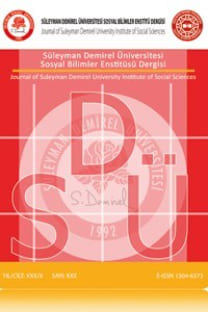HAVACILIK EĞİTİM ORGANİZASYONLARINDA EMNİYET YÖNETİM SİSTEMİ SÜREÇLERİNİN KURUMSAL İTİBAR ÜZERİNDEKİ ETKİSİ: İŞ DOYUMUNUN ARACI ROLÜ
Emniyet Yönetim Sistemi (EYS), Havacılık, Emniyet Yönetimi, İş Doyumu, Kurumsal İtibar
THE EFFECT OF SAFETY MANAGEMENT SYSTEM PROCESSES ON CORPORATE REPUTATION IN AVIATION TRAINING ORGANIZATIONS: THE MEDIATION ROLE OF JOB SATISFACTION
___
- Barney, J. (1991). Firm Resources and Sustained Competitive Advantage. Journal of Management, 99-120.
- Baron, R. M., & Kenny, D. A. (1986). The Moderator-Mediator Variable Distinction in Social Psychological Research: Conceptual, Strategic, and Statistical Considerations. Journal of Personality and Social Psychology, 1173-1182.
- Basım, H. N., & Şeşen, H. (2009). Örgütsel Adalet Algısı-Örgütsel Vatandaşlık Davranışı İlişkisinde İş Tatmininin Aracılık Rolü. Ulusal Yönetim ve Organizasyon Kongresi. Eskişehir: Osmangazi Üniversitesi.
- Baysal Berkup, S. (2015). Fombrun İtibar Katsayı Ölçeği Çerçevesinde Bir İtibar Vaka Çalışması: Arçelik. Uluslararası Sosyal Araştırmalar Dergisi, 859-886.
- Boyd, B. K., Bergh, D. D., & Ketchen Jr., D. J. (2010). Reconsidering the Reputation–Performance Relationship: A Resource-Based View. Journal of Management, 588-609.
- Brayfield, A. H., & Rothe, H. F. (1951). An Index of Job Satisfaction. Journal of Applied Psychology, 307-311.
- Chatzi, A. V. (2019). Safety management systems: an opportunity and a challenge for military aviation organisations. Aircraft Engineering and Aerospace Technology, 190-196.
- Chen, C. F., & Chen, S. C. (2012). Scale development of Safety Management System evaluation for the airline industry. Accident Analysis and Prevention, 177-181.
- Chen, C.-F., & Chen, S.-C. (2014). Measuring the effects of Safety Management System practices, morality leadership and self-efficacy on pilots’ safety behaviors: Safety motivationas a mediator. Safety Science, 376-385.
- Dayanç Kıyat, G. B. (2012). Kurumsal İtibar Katsayısı ve Marka Sadakati İlişkisi: Telekomünikasyon Sektöründe Faaliyet Gösteren Kurumlar Üzerine Bir Araştırma. Basılmamış Doktora Tezi. İstanbul: Marmara Üniversitesi Sosyal Bilimler Enstitüsü.
- FAA. (2019). Annual Report. Washington DC.: Federal Aviation Administation. Fisher, B. (2006). Safety Management Systems 101. ICAO Journal, 17-18.
- Fombrun, C. J. (1996). Reputation. Realizing Value from the Corporate Image. New York: Harvard Business Review Press.
- Fombrun, C. J., Gardberg, N. A., & Sever, J. M. (2000). The Reputation Quotient: A Multi-stakeholder measure of corporate reputation. The Journal of Brand Management, 241-255.
- Gürbüz, S., & Şahin, F. (2018). Sosyal Bilimlerde Araştırma Yöntemleri. Ankara: Seçkin Yayıncılık.
- Hackman, J. R., & Oldham, G. R. (1975). Development of the Job Diagnostic Survey. Journal of Applied Psychology, 159-170.
- Hair, J. F., Black, W. C., Bahin, B. J., & Anderson, R. E. (2014). Multiveriate Data Analysis. England: Pearson Education Limited.
- IATA. (2020, 04 15). ICAO Annual Report-2019. The World of Air Transport in 2019: https://www.icao.int/annual-report-2018/Pages/the-world-of-air-transport-in-2018.aspx
- ICAO. (2018). Safety Management Manual Doc 9859 4th Edition. Montreal: International Civil Aviation Organization.
- International Civil Aviation Organization. (2019). State of Global Aviation Safety. Montreal: ICAO.
- Knoop, R. (1995). Relationships Among Job Involvement, Job Satisfaction and Organizational Commitment for Nurses. Journal of Psychology, 641-666.
- Kurnaz, S. (2020). Havacılıkta Teknoloji Kullanımı ve Aşırı Yorgunluk Yönetimi, Karabulut, A. ve Arğın, E. (Ed.), Dijital Yaşam, Yeni İnsan ve Sonrası (s.263-292), Konya, Literatürk Academia Yayınları.
- Kurt, Y., & Gerede, E. (2018). An Assessment Of Avıatıon Safety Management System Applıcatıons From The New Instıtutıonal Theory Perspectıve. Uluslararası Yönetim İktisat ve İşletme Dergisi, 97-121.
- Lloyd, S., & Hamner, W. C. (1979). Individiual Versus Systems Rewards: Who’s Dissatisfied Why and What’s Their Likely Response. Academy of Management Journal, 781-802.
- Locke, E. A. (1969). What is Job Satisfaction. Organizational Behavior and Human Performance, 309-336.
- Luthans, F. (2011). Organizational Behavior: An evidence-based approach. New York: McGraw-Hill.
- Organization, I. C. (1971). Annual Report Of The Council To The Assembly For 1970 Doc 8918. Montreal: International Civil Aviation Organization.
- Özpehlivan, M. (2018). İş Tatmini: Kavramsal Gelişimi, Bireysel ve Örgütsel Etkileri, Yararları ve Sonuçları. Kırıkkale Üniversitesi Sosyal Bilimler Dergisi, 43-70.
- Ponzi, L. J., Fombrun, C. J., & Gardberg, N. A. (2011). RepTrak Pulse: Conceptualizing and Validating a Short-Form Measure of Corporate Reputation. Corporate Reputation Review, 15-35.
- Remawi, H., Bates, P., & Dix, I. (2011). The relationship between the implementation of a Safety Management System and the attitudes of employees towards unsafe acts in aviation. Safety Science, 625-632.
- Roberts, P. W., & Dowling, G. R. (2002). Corporate Reputation and Sustained Superior Financial Performance. Strategic Management Journal, 1077-1093.
- Schwaiger, M. (2004). Components and Parameters of Corporate Reputation-An Emprical Study. Schmalenbach Business Review, 46-71.
- Shamma, H. M. (2012). Toward a Comprehensıve Understanding of Corporate Reputation: Concept, Measurement and Implications. International Journal of Business and Management, 151-169.
- SHGM. (2012). Emniyet Yönetimi Temel Esasları. Ankara: Pegem Yayıncılık. Tabachnick, B. G., & Fidell, L. S. (2013). Using Multivariate Statistics. Boston: Pearson.
- Teke, A., & Şimşek, H. (2020). Emniyet Yönetim Sistemi Uygulamalarının Kurumsal İmaj Üzerindeki Etkileri: Uçuş Eğitim Organizasyonlarında Bir Araştırma. Journal of Aviation, 45-60.
- Tolkin, J. (2010). Airline Bankruptcy: The Determining Factors Leading to an Airline's Decline. CMC Senior Thesis.
- Uyar, T. (2019). Havacılık Emniyet Yönetim Sistemlerinde Risk Kavramı Ve Risk Değerlendirmede Çerçeveleme Etkisine Yönelik Bir Araştırma. Yayınlanmamış Doktora Tezi. İstanbul Kültür Üniversitesi.
- Weiss, H. M. (2002). Deconstructing job satisfaction Separating evaluations, beliefs and affective experiences. Human Resource Management Review, 173-194.
- Wikipedia. (2020, 04 25). Aviation Safety. Wikipedia, The Free Encylopedia: https://en.wikipedia.org/w/index.php?title=Aviation_safety&oldid=951655541
- Yılmaz, N. H. (2019). Havacılıkta Emniyet Yönetim Sistemi ve Emniyet Kültürü, Havacılık Çalışanlarında Emniyet Kültürü Ölçümü. Kocaeli: Basılmamış Yüksek Lisans Tezi, Kocaeli Üniversitesi Sosyal Bilimler Enstitüsü.
- Yayın Aralığı: Yılda 3 Sayı
- Başlangıç: 2005
- Yayıncı: Süleyman Demirel Üniversitesi
COVİD-19’UN GENÇ İŞGÜCÜNDE YARATACAĞI OLASI TEHLİKE: YARA İZİ
MİMARİNİN YAŞAM KALİTESİNE ETKİSİ: MUDURNU GELENEKSEL EV MİMARİSİ ÖRNEĞİ
Buket KARATOP, Türkcan KARATOP
Esra AKGÜMÜŞ, Gülpembe OĞUZHAN
A. Aslan ŞENDOĞDU, Ayşe Elif YAZGAN, Özlem KARADAĞ AK
KRİPTO PARA İKİLEMİ: KARAPARA AKLAMA VE BİTCOİN
Burcu GEDİZ ORAL, Yusuf YEŞİLKAYA
1946-60 ARASI DÖNEMDE DEMOKRAT PARTİ İLE ALEVİLER ARASINDAKİ İLİŞKİ
CHP MUĞLA İL KONGRESİ ZABITLARINDA MARMARİS’E DAİR KAYITLAR (1940-1951)
ULUSLARARASI İŞLETMELERDE İŞ DEĞERLEME VE ÜCRET YÖNETİMİ UYGULAMALARI
